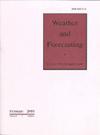评估对南亚季风低压系统成因的集合预测
IF 3
3区 地球科学
Q2 METEOROLOGY & ATMOSPHERIC SCIENCES
引用次数: 0
摘要
被称为季风低压系统(LPS)的同步尺度涡旋经常在南亚地区产生强降水和水文灾害,因此准确预报 LPS 成因对于改善备灾和救灾工作至关重要。然而,数值天气预报模式对低压系统起源预报的准确性一直不为人知。在此,我们评估了两个全球集合模式--美国全球集合预报系统(GEFS)和欧洲中期天气预报中心(ECMWF)的集合预报系统--在预测 2021-2022 年期间低压气流成因方面的性能。全球环境预报系统提前一到两天成功预报了约一半的观测到的低压成因事件;欧洲中期天气预报中心的模式捕捉到了另外10%的观测到的成因事件。在一到两天的提前期,两个模式的误报率(FAR)都在 50%左右。在这两个集合中,与扰动集合成员相比,控制运行通常表现出更高的观测事件探测概率(POD)和更低的误报率。然而,在共识预测中,当至少有 20% 的集合成员预测到 LPS 的形成时,其 POD 值在所有前导时间内都超过了对照运行的 POD 值。此外,对孟加拉湾上空成因的概率预测也很娴熟,因为大多数 LPS 都是在该地区形成的,在 5 天的前导时间内,预测 LPS 形成的集合成员比例接近观测到的成因频率,而无需进行任何调整或偏差校正。本文章由计算机程序翻译,如有差异,请以英文原文为准。
Evaluating ensemble predictions of South Asian monsoon low pressure system genesis
Synoptic-scale vortices known as monsoon low pressure systems (LPS) frequently produce intense precipitation and hydrological disasters in South Asia, so accurately forecasting LPS genesis is crucial for improving disaster preparedness and response. However, the accuracy of LPS genesis forecasts by numerical weather prediction models has remained unknown. Here, we evaluate the performance of two global ensemble models—the U.S. Global Ensemble Forecast System (GEFS) and the Ensemble Prediction System of the European Centre for Medium-Range Weather Forecasts (ECMWF)—in predicting LPS genesis during the years 2021–2022. The GEFS successfully predicted about half the observed LPS genesis events one to two days in advance; the ECMWF model captured an additional 10% of observed genesis events. Both models had a False Alarm Ratio (FAR) around 50% for one- to two-day lead times. In both ensembles, the control run typically exhibited a higher probability of detection (POD) of observed events and a lower FAR compared to the perturbed ensemble members. However, a consensus forecast, in which genesis is predicted when at least 20% of ensemble members forecast LPS formation, had POD values surpassing that of the control run for all lead times. Moreover, probabilistic predictions of genesis over the Bay of Bengal, where most LPS form, were skillful, with the fraction of ensemble members predicting LPS formation over a 5-day lead time approximating the observed frequency of genesis, without any adjustment or bias-correction.
求助全文
通过发布文献求助,成功后即可免费获取论文全文。
去求助
来源期刊

Weather and Forecasting
地学-气象与大气科学
CiteScore
5.20
自引率
17.20%
发文量
131
审稿时长
6-12 weeks
期刊介绍:
Weather and Forecasting (WAF) (ISSN: 0882-8156; eISSN: 1520-0434) publishes research that is relevant to operational forecasting. This includes papers on significant weather events, forecasting techniques, forecast verification, model parameterizations, data assimilation, model ensembles, statistical postprocessing techniques, the transfer of research results to the forecasting community, and the societal use and value of forecasts. The scope of WAF includes research relevant to forecast lead times ranging from short-term “nowcasts” through seasonal time scales out to approximately two years.
 求助内容:
求助内容: 应助结果提醒方式:
应助结果提醒方式:


